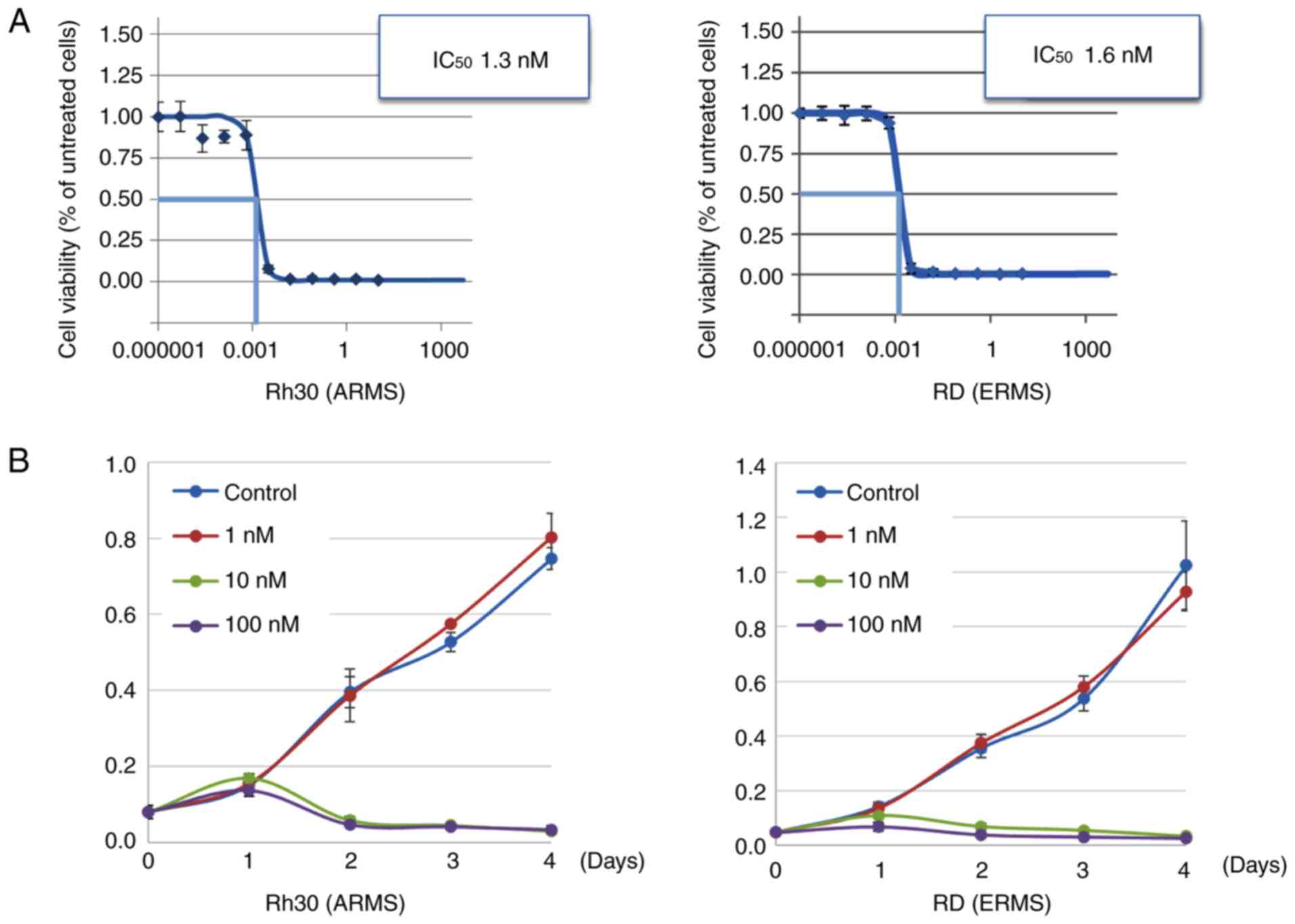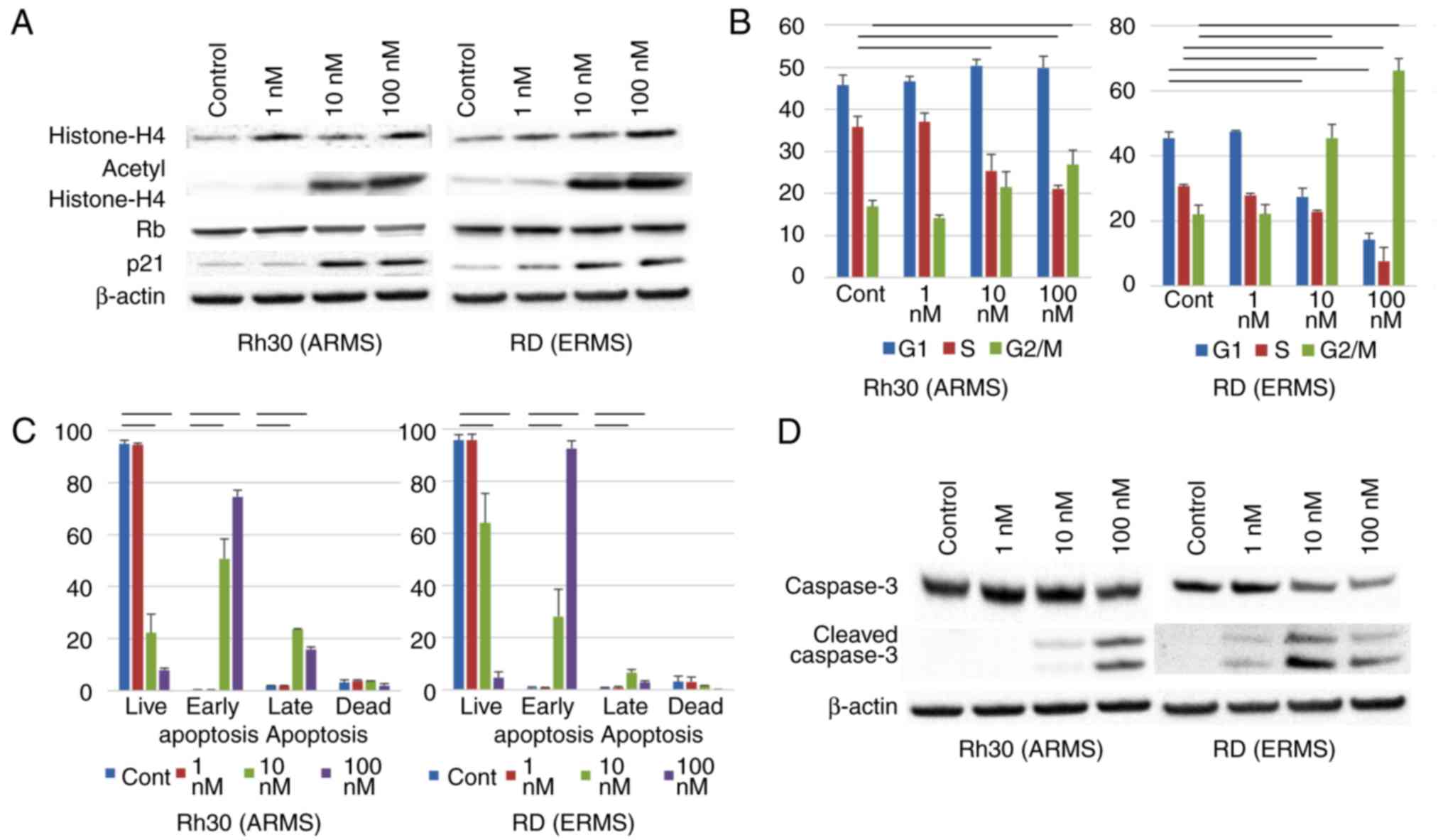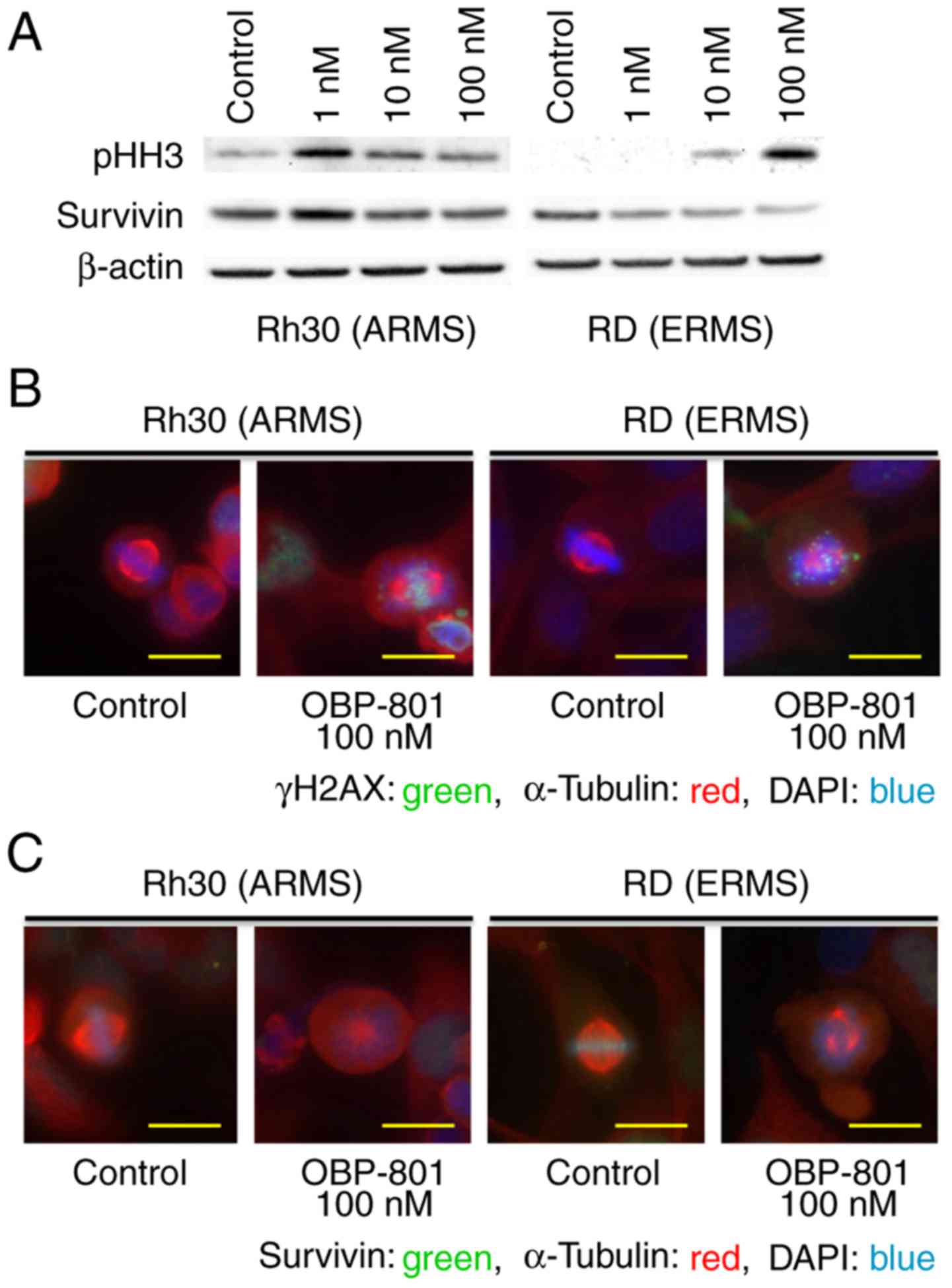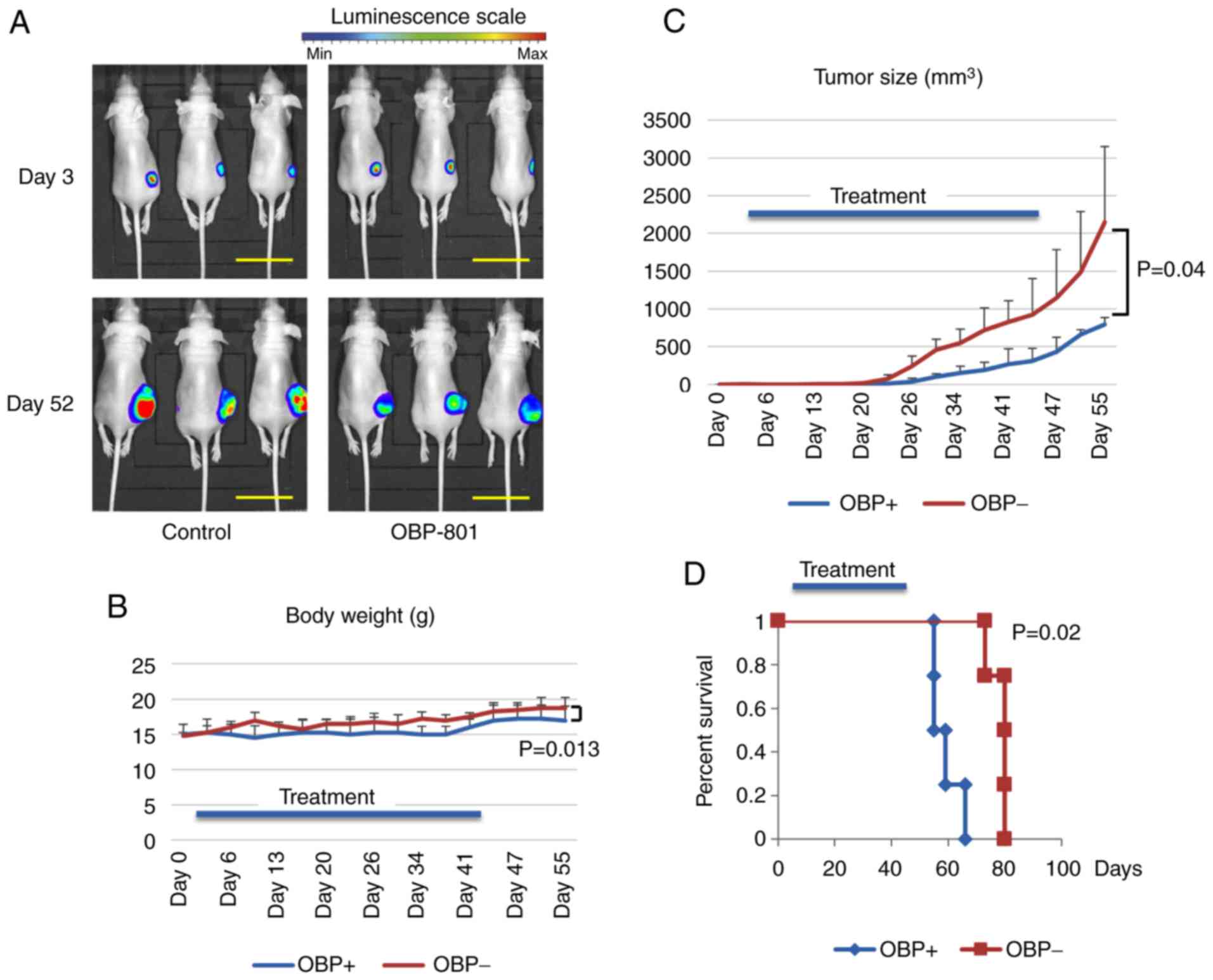|
1
|
Merlino G and Helman LJ:
Rhabdomyosarcoma-working out the pathways. Oncogene. 18:5340–5348.
1999. View Article : Google Scholar : PubMed/NCBI
|
|
2
|
Davicioni E, Anderson MJ, Finckenstein FG,
Lynch JC, Qualman SJ, Shimada H, Schofield DE, Buckley JD, Meyer
WH, Sorensen PH, et al: Molecular classification of
rhabdomyosarcoma-genotypic and phenotypic determinants of
diagnosis: A report from the Children's Oncology Group. Am J
Pathol. 174:550–564. 2009. View Article : Google Scholar : PubMed/NCBI
|
|
3
|
Kikuchi K, Soundararajan A, Zarzabal LA,
Weems CR, Nelon LD, Hampton ST, Michalek JE, Rubin BP, Fields AP
and Keller C: Protein kinase C iota as a therapeutic target in
alveolar rhabdomyosarcoma. Oncogene. 32:286–295. 2013. View Article : Google Scholar : PubMed/NCBI
|
|
4
|
Miyachi M, Kakazu N, Yagyu S, Katsumi Y,
Tsubai-Shimizu S, Kikuchi K, Tsuchiya K, Iehara T and Hosoi H:
Restoration of p53 pathway by nutlin-3 induces cell cycle arrest
and apoptosis in human rhabdomyosarcoma cells. Clin Cancer Res.
15:4077–4084. 2009. View Article : Google Scholar : PubMed/NCBI
|
|
5
|
Sokolowski E, Turina CB, Kikuchi K,
Langenau DM and Keller C: Proof-of-concept rare cancers in drug
development: The case for rhabdomyosarcoma. Oncogene. 33:18772014.
View Article : Google Scholar : PubMed/NCBI
|
|
6
|
Minucci S and Pelicci PG: Histone
deacetylase inhibitors and the promise of epigenetic (and more)
treatments for cancer. Nat Rev Cancer. 6:38–51. 2006. View Article : Google Scholar : PubMed/NCBI
|
|
7
|
Bolden JE, Peart MJ and Johnstone RW:
Anticancer activities of histone deacetylase inhibitors. Nat Rev
Drug Discov. 5:769–784. 2006. View
Article : Google Scholar : PubMed/NCBI
|
|
8
|
Khabele D, Son DS, Parl AK, Goldberg GL,
Augenlicht LH, Mariadason JM and Montgomery RV: Drug-induced
inactivation or gene silencing of class I histone deacetylases
suppresses ovarian cancer cell growth: implications for therapy.
Cancer Biol Ther. 6:795–801. 2007. View Article : Google Scholar : PubMed/NCBI
|
|
9
|
Strait KA, Warnick CT, Ford CD, Dabbas B,
Hammond EH and Ilstrup SJ: Histone deacetylase inhibitors induce
G2-checkpoint arrest and apoptosis in
cisplatinum-resistant ovarian cancer cells associated with
overexpression of the Bcl-2-related protein Bad. Mol Cancer Ther.
4:603–611. 2005. View Article : Google Scholar : PubMed/NCBI
|
|
10
|
Khan O and La Thangue NB: HDAC inhibitors
in cancer biology: Emerging mechanisms and clinical applications.
Immunol Cell Biol. 90:85–94. 2012. View Article : Google Scholar : PubMed/NCBI
|
|
11
|
West AC and Johnstone RW: New and emerging
HDAC inhibitors for cancer treatment. J Clin Invest. 124:30–39.
2014. View
Article : Google Scholar : PubMed/NCBI
|
|
12
|
Porcu P and Wong HK: We should have a
dream: Unlocking the workings of the genome in cutaneous T-cell
lymphomas. Clin Lymphoma Myeloma. 9:409–411. 2009. View Article : Google Scholar : PubMed/NCBI
|
|
13
|
Mann BS, Johnson JR, Cohen MH, Justice R
and Pazdur R: FDA approval summary: Vorinostat for treatment of
advanced primary cutaneous T-cell lymphoma. Oncologist.
12:1247–1252. 2007. View Article : Google Scholar : PubMed/NCBI
|
|
14
|
Jain S and Zain J: Romidepsin in the
treatment of cutaneous T-cell lymphoma. J Blood Med. 2:37–47.
2011.PubMed/NCBI
|
|
15
|
Blattmann C, Oertel S, Ehemann V, Thiemann
M, Huber PE, Bischof M, Witt O, Deubzer HE, Kulozik AE, Debus J, et
al: Enhancement of radiation response in osteosarcoma and
rhabdomyosarcoma cell lines by histone deacetylase inhibition. Int
J Radiat Oncol Biol Phys. 78:237–245. 2010. View Article : Google Scholar : PubMed/NCBI
|
|
16
|
Kutko MC, Glick RD, Butler LM, Coffey DC,
Rifkind RA, Marks PA, Richon VM and LaQuaglia MP: Histone
deacetylase inhibitors induce growth suppression and cell death in
human rhabdomyosarcoma in vitro. Clin Cancer Res. 9:5749–5755.
2003.PubMed/NCBI
|
|
17
|
Abraham J, Nuñez-Álvarez Y, Hettmer S,
Carrió E, Chen HI, Nishijo K, Huang ET, Prajapati SI, Walker RL,
Davis S, et al: Lineage of origin in rhabdomyosarcoma informs
pharmacological response. Genes Dev. 28:1578–1591. 2014. View Article : Google Scholar : PubMed/NCBI
|
|
18
|
Shindoh N, Mori M, Terada Y, Oda K, Amino
N, Kita A, Taniguchi M, Sohda KY, Nagai K, Sowa Y, et al: YM753, a
novel histone deacetylase inhibitor, exhibits antitumor activity
with selective, sustained accumulation of acetylated histones in
tumors in the WiDr xenograft model. Int J Oncol. 32:545–555.
2008.PubMed/NCBI
|
|
19
|
Kubo K, Naoe T, Utsumi KR, Ishiguro Y,
Ueda K, Shiku H and Yamada K: Cytogenetic and cellular
characteristics of a human embryonal rhabdomyosarcoma cell line,
RMS-YM. Br J Cancer. 63:879–884. 1991. View Article : Google Scholar : PubMed/NCBI
|
|
20
|
Kikuchi K, Tsuchiya K, Otabe O, Gotoh T,
Tamura S, Katsumi Y, Yagyu S, Tsubai-Shimizu S, Miyachi M, Iehara
T, et al: Effects of PAX3-FKHR on malignant phenotypes in alveolar
rhabdomyosarcoma. Biochem Biophys Res Commun. 365:568–574. 2008.
View Article : Google Scholar : PubMed/NCBI
|
|
21
|
Kikuchi K, Hettmer S, Aslam MI, Michalek
JE, Laub W, Wilky BA, Loeb DM, Rubin BP, Wagers AJ and Keller C:
Cell-cycle dependent expression of a translocation-mediated fusion
oncogene mediates checkpoint adaptation in rhabdomyosarcoma. PLoS
Genet. 10:e10041072014. View Article : Google Scholar : PubMed/NCBI
|
|
22
|
Nishijo K, Hosoyama T, Bjornson CR,
Schaffer BS, Prajapati SI, Bahadur AN, Hansen MS, Blandford MC,
McCleish AT, Rubin BP, et al: Biomarker system for studying muscle,
stem cells, and cancer in vivo. FASEB J. 23:2681–2690. 2009.
View Article : Google Scholar : PubMed/NCBI
|
|
23
|
Marks PA, Richon VM, Miller T and Kelly
WK: Histone deacetylase inhibitors. Adv Cancer Res. 91:137–168.
2004. View Article : Google Scholar : PubMed/NCBI
|
|
24
|
Ungerstedt JS, Sowa Y, Xu WS, Shao Y,
Dokmanovic M, Perez G, Ngo L, Holmgren A, Jiang X and Marks PA:
Role of thioredoxin in the response of normal and transformed cells
to histone deacetylase inhibitors. Proc Natl Acad Sci USA.
102:673–678. 2005. View Article : Google Scholar : PubMed/NCBI
|
|
25
|
Zupkovitz G, Grausenburger R, Brunmeir R,
Senese S, Tischler J, Jurkin J, Rembold M, Meunier D, Egger G,
Lagger S, et al: The cyclin-dependent kinase inhibitor p21 is a
crucial target for histone deacetylase 1 as a regulator of cellular
proliferation. Mol Cell Biol. 30:1171–1181. 2010. View Article : Google Scholar : PubMed/NCBI
|
|
26
|
Bose P, Dai Y and Grant S: Histone
deacetylase inhibitor (HDACI) mechanisms of action: Emerging
insights. Pharmacol Ther. 143:323–336. 2014. View Article : Google Scholar : PubMed/NCBI
|
|
27
|
Galluzzi L, Vitale I, Aaronson SA, Abrams
JM, Adam D, Agostinis P, Alnemri ES, Altucci L, Amelio I, Andrews
DW, et al: Molecular mechanisms of cell death: recommendations of
the Nomenclature Committee on Cell Death 2018. Cell Death Differ.
25:486–551. 2018. View Article : Google Scholar : PubMed/NCBI
|
|
28
|
Castedo M, Perfettini JL, Roumier T,
Andreau K, Medema R and Kroemer G: Cell death by mitotic
catastrophe: A molecular definition. Oncogene. 23:2825–2837. 2004.
View Article : Google Scholar : PubMed/NCBI
|
|
29
|
Vitale I, Galluzzi L, Castedo M and
Kroemer G: Mitotic catastrophe: a mechanism for avoiding genomic
instability. Nat Rev Mol Cell Biol. 12:385–392. 2011. View Article : Google Scholar : PubMed/NCBI
|
|
30
|
Cornago M, Garcia-Alberich C,
Blasco-Angulo N, Vall-Llaura N, Nager M, Herreros J, Comella JX,
Sanchis D and Llovera M: Histone deacetylase inhibitors promote
glioma cell death by G2 checkpoint abrogation leading to mitotic
catastrophe. Cell Death Dis. 5:e14352014. View Article : Google Scholar : PubMed/NCBI
|
|
31
|
Li Y, Kao GD, Garcia BA, Shabanowitz J,
Hunt DF, Qin J, Phelan C and Lazar MA: A novel histone deacetylase
pathway regulates mitosis by modulating Aurora B kinase activity.
Genes Dev. 20:2566–2579. 2006. View Article : Google Scholar : PubMed/NCBI
|
|
32
|
Nalawansha DA, Gomes ID, Wambua MK and
Pflum MKH: HDAC inhibitor-induced mitotic arrest ss mediated by
Eg5/KIF11 acetylation. Cell Chem Biol. 24:481–492. 2017. View Article : Google Scholar : PubMed/NCBI
|
|
33
|
Aljaberi AM, Webster JR and Wheatley SP:
Mitotic activity of survivin is regulated by acetylation at K129.
Cell Cycle. 14:1738–1747. 2015. View Article : Google Scholar : PubMed/NCBI
|


















